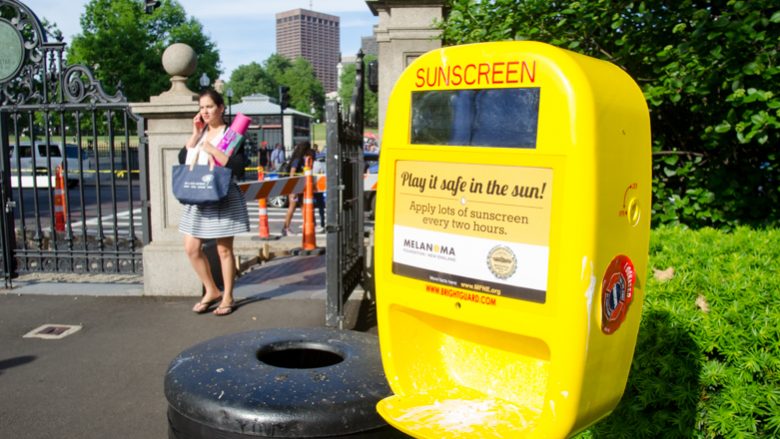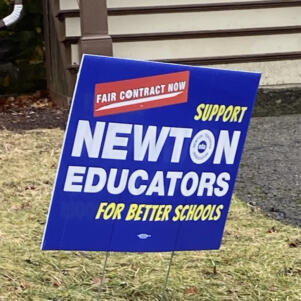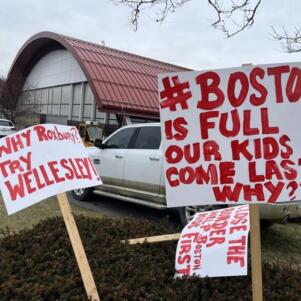Free sunscreen offered at 200 spots around Boston, New England
By Beth Treffeisen | June 2, 2016, 16:01 EDT
 One of the 200 free sunscreen dispensers seen here near an entrance to the Boston Public Garden. (New Boston Post photo by Beth Treffeisen)
One of the 200 free sunscreen dispensers seen here near an entrance to the Boston Public Garden. (New Boston Post photo by Beth Treffeisen) BOSTON – With summer just around the corner, locals and tourists alike will soon start soaking up some sun at area parks and beaches. But that means more exposure to potentially harmful rays.
To help people protect themselves outdoors in Boston, the Melanoma Foundation of New England and the Boston Parks and Recreation Department have teamed up for a second summer to place 200 sun screen dispensers in public places around Boston and the New England region, offering the lotion for free. Neighboring cities are also taking part including Somerville, Newton, and Medford. Visitors like it.
“I think it’s a brilliant idea,” said a tourist visiting the Hub from Scotland who gave his name as Craig.
Last year, Boston joined Miami Beach, Florida, in installing the free dispensers. The Melanoma Foundation is subsidizing the cost of the program, which includes the $400 preloaded dispensers and $200 for each lotion refill, drawing on donations. The Melanoma Foundation gave the city of Boston 30 dispensers along with 20 to the Boston Parks and Recreation Department.
Each unit will provide all-natural sunscreen with a protection factor of 30 that is safe for anyone at least six months old.
“We really wanted to start with a gold standard,” said Deb Girard, the foundation’s executive director. “We didn’t want to have any issues.”
Last year’s pilot program brought some problems to light, including clumping of the lotion, people taking too much and leaving the excess on statues, park benches and even rocks.
“I think people loved the concept of them,” said Ryan Woods, the Parks Department’s director of external affairs. Some areas had to be power-washed to clean them up. “The logistical issues with consistency and the amount that came out was a problem,” he said.
This year, Girard said the dispensers were redesigned to limit the amount provided with each pump. She said the foundation aims to learn even more about how the program is working by sending out student interns from Babson College to survey users and examine the differences between park use versus at beaches.
“We are going to have a summer’s worth of data to grow this program,” Girard said. “We really need communities and companies to come together directly around sunscreen because it is really life saving.”
In up to 90 percent of skin cancer cases, over exposure to the sun’s ultraviolet rays is thought to be a cause. Sunscreen helps to limit that risk factor.
According to the U.S. Centers for Disease Control and Prevention in Atlanta, 67,753 Americans were diagnosed with skin cancer in 2012. In Massachusetts, 19.3 cases per 100,000 people occur each year, and an even higher rate afflicts those with lighter skin, federal figures show.
This year, the foundation’s program will place in the same locations as last year, including at Millennium Park in West Roxbury; Jamaica Pond in Jamaica Plain; on Boston Common; at Christopher Columbus Park in the North End; and at the East Boston Stadium and the neighborhood’s Memorial Park.
While appreciative, city visitors like Ann from Scotland say the dispensers might be better publicized.
“We didn’t even notice them,” Ann said with a laugh, and suggested the use of signs to point out the availability of free sun screen.
But even beyond that, some Bostonians said they’d like to see more information about the lotion and what it contains.
Star Fitzgerald, a Boston native, was concerned about not being able to find the ingredients listed on the dispensers.
“You want to be able to protect your skin,” Fitzgerald said. “But I want to also be able to read the table,” to know what I’m putting on myself.
The idea to set up the free dispensers followed a call to action from the U.S. Surgeon General in 2014 to help prevent skin cancer. At the time, City Councilor Matt O’Malley responded by urging the city to create a citywide sunscreen initiative, prompting the Melanoma Foundation to respond.
Girard believed that City Councilor Matt O’Malley said it right when he said, “It is a social justice issue,” Girard said, concurring with O’Malley’s judgment. “For many, many people, sunscreen is not on the top 10 things to buy,” and can range from $10 to $30 a tube.
By setting up the free dispensers, she said, the foundation is helping to bridge that gap and reduce the risk of cancer.
“It’s not a lot of money for lots of protection.”
NBPHealth











